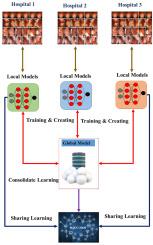基于区块链的胶囊网络联合学习和增量极限学习机,用于无线胶囊内窥镜中胃肠出血检测
IF 8
2区 计算机科学
Q1 AUTOMATION & CONTROL SYSTEMS
Engineering Applications of Artificial Intelligence
Pub Date : 2025-10-15
DOI:10.1016/j.engappai.2025.112745
引用次数: 0
摘要
在医学领域,无线胶囊内窥镜(WCE)在不刺激患者的情况下诊断胃肠道(GI)出血。不幸的是,由于使用了大量的数据,WCE图像的准确性仍然存在一些问题。研究人员在检测消化道出血方面面临的主要挑战是感染的快速增长和缺乏可靠的检测。人工智能(AI)使胃肠道出血诊断更容易。在保持机密性的同时,不同医院之间的数据共享具有挑战性。本研究创建了一种人工智能方法,该方法从四家医院收集数据,并使用基于区块链的联邦学习(FL)来构建提议的模型。区块链技术(BCT)用于检查数据的准确性和质量,FL用于在维护组织机密性的同时在全球范围内训练模型。首先,我们开发了一种数据规范化技术来处理从四个来源收集的数据。其次,我们使用增量极限学习机(ielm)和胶囊网络(CapsNet)对消化道出血患者进行分类。最后,我们提出了一种利用BCT和FL联合开发全局模型以保证隐私的技术。该模型的性能与五种深度学习(DL)模型进行了比较,该模型通过对胃WCE图像进行详细测试来预测胃肠道出血,同时保护了各种用户的数据隐私。我们的结果显示,识别胃肠道出血个体的准确率提高了98.23%。此外,该模型提高了医疗专业人员诊断胃肠道出血的技能,从而使医疗决策程序更好、更有效。本文章由计算机程序翻译,如有差异,请以英文原文为准。

Blockchain-enabled federated learning with capsule network and incremental extreme learning machines for gastrointestinal bleeding detection in wireless capsule endoscopy
In the medical field, a wireless capsule endoscopy (WCE) diagnose gastrointestinal (GI) bleeding without any irritation to the patients. Unfortunately, there are still some problems with the accuracy of WCE images due to the substantial number of data used. The main challenges for the researchers in detecting GI bleeding are the rapid growth of the infection and the lack of reliable testing. Artificial intelligence (AI) makes GI bleeding diagnosis easier. Data sharing between different hospitals while maintaining confidentiality is challenging. This study creates a AI method that gathers data from four hospitals and uses blockchain-based federated learning (FL) to build a proposed model. Blockchain technology (BCT) is utilized to check the accuracy and quality of data and FL is used to train the model globally while upholding the organizations confidentiality. Firstly, we developed a data normalization technique to handle data collected from four sources. Secondly, we classify GI bleeding patients by employing incremental extreme learning machines (IELMs) and capsule networks (CapsNet). Lastly, we present a technique for jointly developing a global model with BCT and FL to ensure privacy. The performance of the proposed model is compared with five deep learning (DL) models for predicting GI bleeding using detailed testing on stomach WCE images while securing the data privacy of various users. Our results shows an improvement in recognizing GI bleeding individuals, with a 98.23 % accuracy rate. Furthermore, this model enhance the skills of medical professionals in diagnosing GI bleeding resulting in better and more efficient medical decision-making procedures.
求助全文
通过发布文献求助,成功后即可免费获取论文全文。
去求助
来源期刊

Engineering Applications of Artificial Intelligence
工程技术-工程:电子与电气
CiteScore
9.60
自引率
10.00%
发文量
505
审稿时长
68 days
期刊介绍:
Artificial Intelligence (AI) is pivotal in driving the fourth industrial revolution, witnessing remarkable advancements across various machine learning methodologies. AI techniques have become indispensable tools for practicing engineers, enabling them to tackle previously insurmountable challenges. Engineering Applications of Artificial Intelligence serves as a global platform for the swift dissemination of research elucidating the practical application of AI methods across all engineering disciplines. Submitted papers are expected to present novel aspects of AI utilized in real-world engineering applications, validated using publicly available datasets to ensure the replicability of research outcomes. Join us in exploring the transformative potential of AI in engineering.
 求助内容:
求助内容: 应助结果提醒方式:
应助结果提醒方式:


